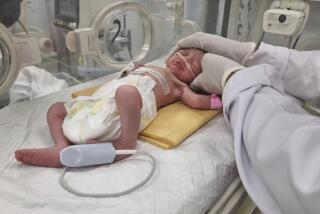Arafat’s Wife Decides to Have Baby in Paris, Not Gaza
JERUSALEM — Fearing for the health and safety of her child, Yasser Arafat’s wife, Suha Tawil, has made a decision that is scandalizing Palestinian society: She will give birth to the couple’s first-born in Paris rather than in the Gaza Strip, where her husband is trying to build a Palestinian state.
“Our child was conceived in Gaza, but the sanitary conditions there are deplorable,” Tawil told Le Parisien in an interview published Monday. “I was afraid to give birth there, not for me, but for the baby. It is the normal reaction of a mother.”
She granted the interview as her recently published autobiography, “A Child of Palestine,” began appearing in Paris bookstores. The book was co-written with a French journalist, Jerrard Sabbag, who is Jewish.
A spokeswoman for Tawil, in a telephone interview from Paris on Thursday, confirmed the interview’s accuracy. Tawil, in mourning for her father who died in Paris this week, was unavailable for comment.
Her decision is likely to elevate what has always been a controversial marriage to the status of political embarrassment for Arafat, a man who has symbolized the Palestinian national movement for more than three decades.
“I will not deny that if the baby was born in Palestine, it would be better, politically speaking,” said Aysem Zein, an activist in Fatah, the Palestine Liberation Organization’s largest faction. “The child of Arafat being born on liberated Palestine land, not in exile,” would have been a powerful symbol, said Zein, who lives in the West Bank town of Ramallah, Tawil’s hometown.
“However, Suha is the mother and the decision is hers,” Zein said. “One cannot blame her for the decision because health conditions are not very satisfactory in Gaza hospitals and this is the first child of Palestine. Everything must go well” with the birth, expected in early August.
Ironically, the PLO-run Voice of Palestine radio reported Thursday that Arafat will open a new “modernized and developed” maternity ward and neonatal intensive care unit at Shifa Hospital in Gaza City in the next two days.
“Hopefully, her decision to have the first child outside the homeland will put pressure on her husband and the sulta [Palestinian Authority] to do something about the health conditions and to think about the majority of Palestinian mothers who give birth in poor sanitary conditions,” said Zuhair Dibi, a Fatah activist in the West Bank city of Nablus.
Arafat, who for years described himself to interviewers as “married to the revolution,” secretly married Tawil, a Christian from a wealthy West Bank family, in 1990. Arafat then was 60 years old; she was 29.
The marriage caused an uproar among Arafat’s lieutenants, who feared that it would tarnish the grizzled chairman’s image. Tawil’s youth, her religion and her lack of an activist record were all held against her.
In September, 1993, Arafat bowed to pressure from his colleagues and left Tawil behind at his Tunis headquarters when he signed his historic accord with the Israelis on the White House lawn. But in 1994, when he returned to Gaza to head the Palestinian Authority, Arafat brought Tawil there to live.
*
Tawil arrived vowing to fight for women’s rights in the conservative, poverty-stricken and almost exclusively Muslim Gaza Strip. But she found herself unable to break into Arafat’s inner circle and virtually powerless.
Friends say Tawil grew deeply unhappy in Gaza, where her movements were restricted and her French-influenced style criticized. Soon after she became pregnant, the Sorbonne-educated Tawil left for Paris, where she joined her mother, Raymonda Tawil, an early pioneer of Palestinian-Israeli coexistence.
More to Read
Sign up for Essential California
The most important California stories and recommendations in your inbox every morning.
You may occasionally receive promotional content from the Los Angeles Times.










